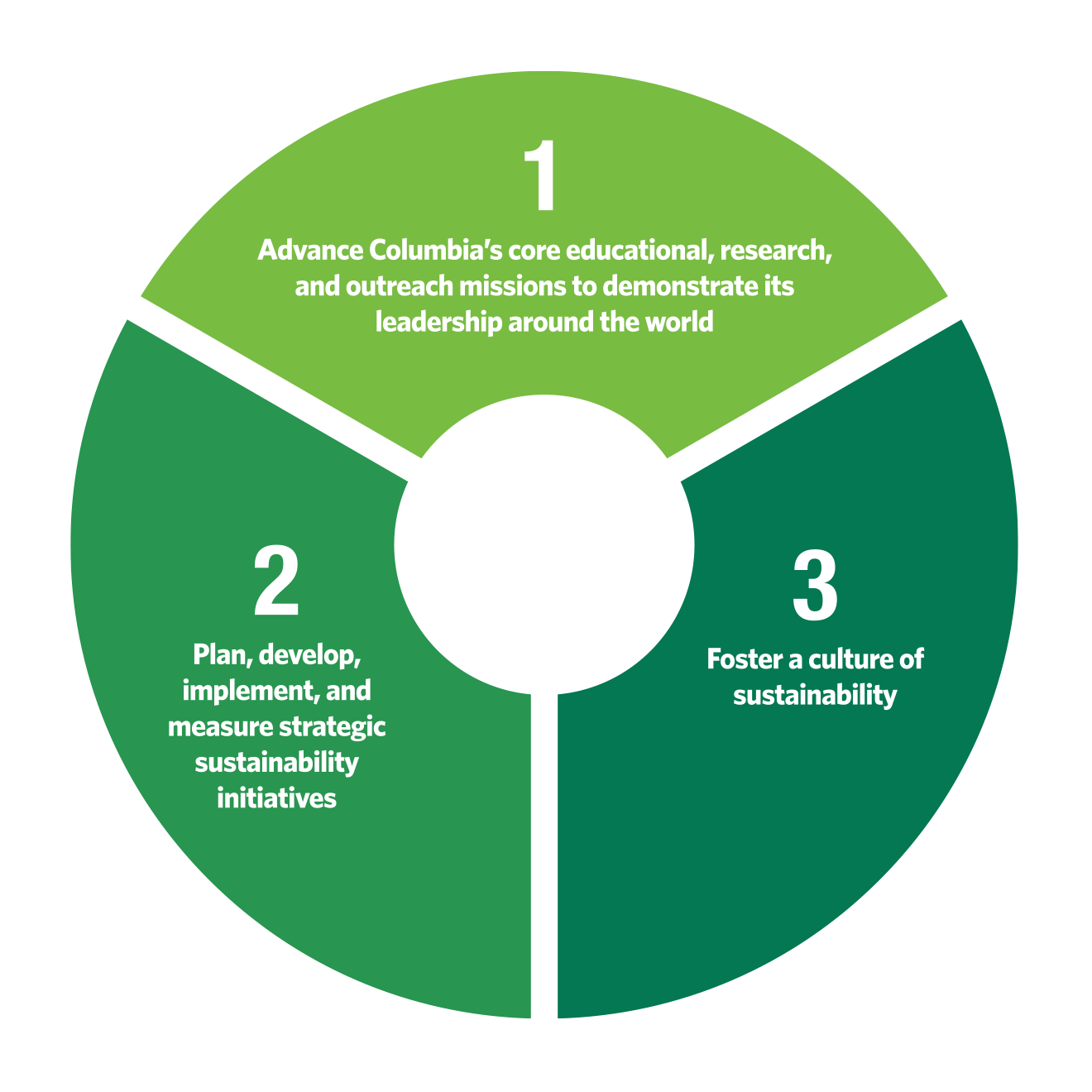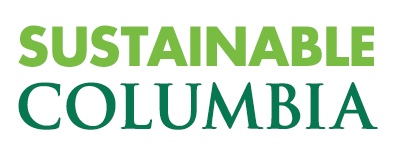Sustainability Principles
Columbia University recognizes that for its commitment to sustainability to become embedded over the long term, policy must be set to formalize it as a leading value. To achieve this, President Bollinger formally endorsed a set of Sustainability Principles in September 2016 to set forth a high-level vision for sustainability for Columbia’s campus communities in New York and across the globe. The principles were developed through a partnership between University Facilities and Operations—including the Office of Sustainability—and Earth Institute faculty leadership.
The Sustainability Principles highlight three key pillars, to which each campus of the University has a commitment to adhere through targeted policies, commitments, and standard practices, and individual daily actions. As part of this commitment, Columbia commits and strives to
- advance Columbia’s core educational, research, and outreach missions to demonstrate its leadership around the world;
- plan, develop, implement, and measure strategic sustainability initiatives; and
- foster a culture of sustainability.

The University is committed to following a set of sustainability principles in all facets of planning and operations so that Columbia can improve environmental performance, ensure a healthy community, and contribute to local, regional, and global solutions.
These principles apply University-wide—not only to the Morningside campus, but also to CUMC, LDEO, Nevis Labs, Manhattanville, Baker Field Athletics Complex, the many residential properties owned by the University, and other facilities such as the Columbia Global Centers. Columbia recognizes that implementation may not occur in all places all at once, and that some of the principles will require more advance work than others; implementation will occur in as expedited a manner as practicable.
Each campus should adopt ways to adhere to these principles through targeted policies, commitments, and standard practices, as well as individual everyday actions. These will be essential to realize our vision of incorporating sustainability into every aspect of campus life.
- Enhance education, research, and public outreach activity to promote sustainability and disseminate knowledge about how earth systems operate, how humans affect them, and how negative impacts can be reduced and reversed; prepare current and future generations to utilize and advance this knowledge.
- Enhance the sustainability of the physical operations of the University to improve its own environmental performance, and also to develop, test, measure, and improve methods that can be broadly applicable around the world.
Columbia commits to adopt institutional practices that promote sustainability. All of these practices should apply to Columbia's own operations, and should be used as primary criteria for selecting suppliers of energy, food, materials, products, and services:
- Develop baseline measures of use and efficiency for energy, water, and other resources, and adopt periodic monitoring and reporting of these and other measures of Columbia’s environmental performance.
- Using a consensus-building and participatory process, adopt and periodically update campus-specific measurable goals. Where applicable, goals should be science-based and take into consideration the appropriate city, state, federal, or international goals and standards, in the following areas:
- reduce greenhouse gas emissions from campus operations, and reduce electricity and fuel purchases;
- conserve resources and minimize waste through efficiency, conservation, reuse, recycling, source reduction, and composting;
- maximize the use of renewable resources (including energy);
- use water resources efficiently, and minimize total water demand;
- construct, maintain, and renovate buildings to provide safe, healthy, and productive; indoor environments that use energy, water, and other natural resources efficiently;
- seek mode shifts in order to reduce the number of drive-alone commuters by expanding the number of alternative mobility options such as bicycling, shared vehicles, shuttles, and mass transit; and
- seek ways to reduce the need for travel, such as electronic communications.
- Take into consideration projections about future climate conditions, and adaptation in its capital and operational planning, and make appropriate preparations.
- Organize an inclusive sustainability governance model that centralizes sustainability reporting and decision-making around these topics.
- Develop publicly available sustainability indicators and planning tools, to enable monitoring, reporting, and continuous improvement; to enable comparative analysis of environmental performance; and to facilitate and support engagement of the University community.
- To ensure implementation of these principles, devote sufficient organizational and financial resources, put in place mechanisms of responsibility and accountability, and integrate the goals into management decision-making; consider the potential for operational cost savings (such as lower energy bills) in making decisions on capital projects.
Columbia commits to fostering a culture of sustainability. Targeted policies and practices as well as individual, everyday actions are essential to realizing the University’s vision of incorporating sustainability into every aspect of campus life. The University should foster thinking and decision-making that persist even after students graduate and other members of the community move on.
The University encourages all members of its community to:
- Increase each other’s level of awareness around sustainability, encouraging each other to personally take action to support the University’s sustainability efforts and obligations
- Lead by example, exhibiting day-to-day behavior that minimizes environmental impacts on the campus grounds, local workspaces, living quarters, and recreation spaces
- Empower students, staff, and faculty to be agents of behavioral change who mobilize their knowledge in concrete ways on campus to build a sustainable campus community
- Collaborate to set goals around sustainability and provide transparency about progress on campus and beyond; seek ways to participate in events and teams that bring the campus community together around sustainability, including but not limited to school-based Green Teams, student energy challenges, donation fairs, and recognition events that celebrate success
Adherence to and adoption of these principles are essential to realizing Columbia’s vision of incorporating sustainability into every aspect of campus life.
